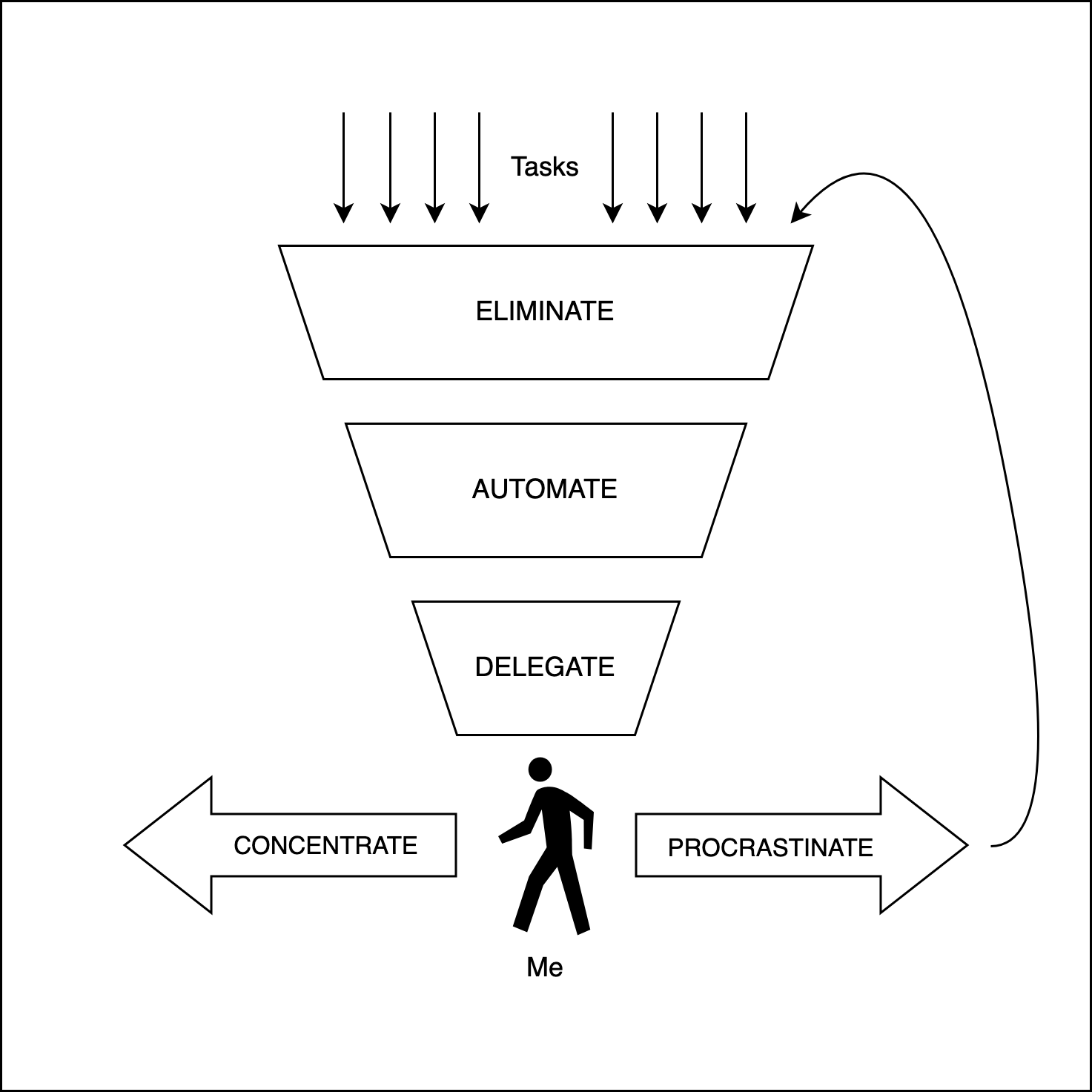Mastering Productivity: The Focus Funnel Approach by Rory Vaden
AIDAS BENDORAITIS / AUGUST 21, 2023
Entrepreneurship, Decision Making, Business, Project Management, Prioritization
AIDAS BENDORAITIS / AUGUST 21, 2023
Entrepreneurship, Decision Making, Business, Project Management, Prioritization
Reading time: 3 minutes.
In the fast-paced world of business and personal goals, effective time management is a crucial skill. Rory Vaden, a renowned speaker and author, has introduced a powerful concept known as the Focus Funnel, which revolutionizes the way we approach tasks and priorities. This approach, outlined in his book “Procrastinate on Purpose: 5 Permissions to Multiply Your Time,” and further discussed in his TEDx talk, offers a structured yet flexible strategy to enhance productivity. In this blog post, we’ll delve into the five steps of the Focus Funnel and provide real-life examples for entrepreneurs, project managers, and decision makers.

The first step in the Focus Funnel is to eliminate tasks that don’t contribute significantly to your goals. It’s about recognizing what activities are simply time-wasters and removing them from your schedule. By doing so, you free up valuable time and mental space for tasks that truly matter.
Example for Entrepreneurs: An entrepreneur might find themselves spending excessive time on social media without any clear purpose. By eliminating mindless scrolling, they can redirect their energy towards refining their business strategy or developing new products.
Example for Project Managers: A project manager might realize that weekly status meetings have become redundant and time-consuming. By eliminating these meetings and instead using a project management tool for updates, they can focus on more critical project-related decisions.
Example for Decision Makers: Decision makers often get bogged down in minor operational decisions. By eliminating decisions such as minor task order or simple daily routines, they can concentrate on strategic choices that shape the company’s direction.
Automation is the second step of the Focus Funnel. This involves identifying tasks that can be systemized and executed automatically. Automation not only saves time but also ensures consistency and accuracy in repetitive processes.
Example for Entrepreneurs: An entrepreneur handling online sales can automate order processing and customer notifications, allowing them to invest their time in customer relationship building.
Example for Project Managers: Project managers can use automated task tracking tools to keep team members informed about deadlines and progress, streamlining communication and reducing the need for manual follow-ups.
Example for Decision Makers: Decision makers can automate routine financial reports, ensuring that critical data is consistently available without manual effort.
Delegation is a key skill in effective leadership. By delegating tasks that others can handle competently, you free up your own time to focus on higher-value responsibilities.
Example for Entrepreneurs: An entrepreneur can delegate administrative tasks to a virtual assistant, allowing them to focus on strategic planning and business growth.
Example for Project Managers: A project manager can delegate specific tasks to team members based on their expertise, enabling the project manager to oversee the big picture and ensure smooth coordination.
Example for Decision Makers: Decision makers can delegate the research and analysis of potential business opportunities to a specialized team, enabling them to make informed choices without getting lost in details.
Concentration involves dedicating focused time to tasks that align with your core goals. This step emphasizes the importance of deep work and undistracted attention.
Example for Entrepreneurs: An entrepreneur can allocate specific blocks of time for creative brainstorming sessions, fostering innovation and strategic thinking.
Example for Project Managers: A project manager can set aside concentrated periods for project planning, allowing for comprehensive timelines and resource allocation.
Example for Decision Makers: Decision makers can designate time to analyze market trends and competitive landscapes, aiding in making informed and forward-thinking decisions.
The final step of the Focus Funnel is a unique take on procrastination. Instead of avoiding tasks, Vaden suggests strategically postponing tasks that don’t align with immediate goals. Those tasks eventually go to the top of the funnel and are revisited later.
Example for Entrepreneurs: An entrepreneur delaying a product launch to refine its features after receiving customer feedback is an instance of procrastinating on purpose, ensuring a more successful launch.
Example for Project Managers: A project manager delaying a less critical project to address an urgent issue in another project demonstrates a thoughtful approach to prioritization.
Example for Decision Makers: A decision maker might intentionally delay a major company restructuring until market conditions are more favorable, showcasing strategic decision-making.
The Focus Funnel introduced by Rory Vaden offers a structured approach to time management that can be tailored to individual preferences and work environments. By progressing through the steps of elimination, automation, delegation, concentration, and purposeful procrastination, entrepreneurs, project managers, and decision makers can significantly enhance their productivity and achieve greater success in their endeavors. Remember, it’s not just about doing more tasks but about doing the right tasks that align with your goals and aspirations.
Cover photo by Karolina Grabowska